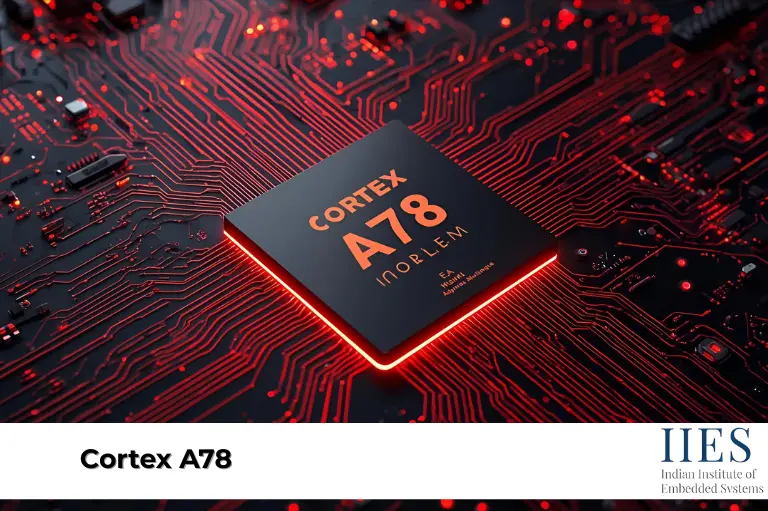Why the Cortex A78 Matters
The Cortex A78 is more than just an upgrade—it reflects ARM’s vision for future mobile and embedded computing. With smartphones now doubling as AI machines, gaming consoles, and productivity hubs, processors must balance speed, efficiency, and security. Comparisons like cortex a78c show that this processor is versatile and modern.

1.Performance Boost You Can Feel
With a 20% speed gain over the Cortex A77, apps run smoother and multitasking feels effortless. Heavy tasks like gaming and editing stay fast.
- 20% faster than the Cortex A77 in sustained workloads.
- Handles heavier multitasking without slowing down.
- Improved branch prediction and memory systems keep apps smooth.
Clear improvements are seen when comparing Cortex A78 vs Cortex A76 in benchmarks.
2. Power Efficiency That Saves Battery
The A78 uses 50% less power at the same performance compared to the A77. This makes it perfect for devices where battery life matters most.
- The Cortex A78 is 50% more power-efficient than the Cortex A77 at equal performance.
- Built with smarter power management features.
- Perfect for embedded devices and wearables, where energy savings extend device life.
Efficiency comparisons such as cortex a78 vs snapdragon 888 demonstrate A78’s edge in battery and performance balance.
3. Smaller, Smarter Manufacturing
Built on a 5nm process, the A78 packs more power into a smaller chip. This design improves efficiency while keeping devices slim and lightweight.
- Cortex A76 and A77 → built on 7nm process.
- Cortex A78 → upgraded to refined 5nm technology.
- More transistors per mm², which means:
- Higher speeds
- Lower heat
- Smaller chip area
When compared with cortex a78 vs a720, the A78 shows superior efficiency and compact design.
4. Thermal Management for Long Use
Better thermal handling lets the A78 run cooler for longer sessions. It reduces throttling, so users enjoy stable performance without overheating.
- The Cortex A78 includes better Dynamic Thermal Management (DTM).
- Allows devices to sustain performance longer without throttling.
- Supports intensive gaming, video editing, and AI tasks without overheating.
Compared to the A76 and A77, which could drop speeds under long stress, the A78 is more reliable for extended high-performance use.
5. AI and Machine Learning Superiority
The A78 doubles AI performance compared to older cores. It handles modern workloads like image recognition and voice processing with ease.
- The Cortex A78 is optimized for AI and ML tasks.
- Up to 2x better AI performance than the A76.
- Smarter handling of neural network workloads.
The A78 even compares well against older designs like cortex a57 vs A78, highlighting improvements in AI performance and efficiency.

6. Smarter Memory System
Upgraded cache and faster memory access give the A78 smoother data handling. This helps in running demanding apps with less lag.
- Improved cache designs (L1 and L2).
- Faster prefetching algorithms for quicker data access.
- Reduced latency and better bandwidth handling.
Memory handling competes with cores such as kryo 660 gold vs cortex a78, showing real gains in app responsiveness.
7. Flexible and Scalable Design
Manufacturers can scale the A78 for both high-end and mid-range devices.
Manufacturers can tune the A78 for both high-end and mid-range devices. This flexibility makes it a fit for smartphones, IoT, and embedded systems.
- Offers scalability for different devices:
- Premium smartphones → maximum performance.
- IoT and mid-range devices → optimized efficiency.
- Easier for manufacturers to customize performance vs. battery trade-offs.
Compared to cortex x1 vs a78, the A78 offers a better balance of efficiency and performance across device types.
8. Stronger Security Features
With PAC and BTI, the A78 resists modern cyberattacks more effectively. It keeps sensitive tasks like payments and IoT communication safer.
- The A78 integrates Pointer Authentication (PAC) and Branch Target Identification (BTI).
- Protects against code reuse attacks and branch manipulation exploits.
- Provides a trusted foundation for mobile payments, enterprise apps, and IoT systems.
Older generations lacked these stronger protections, making the A78 the most secure Cortex yet.

Conclusion
The Cortex A78 marks a significant step forward from the A76 and A77. With its speed, efficiency, AI capabilities, and security features, it sets a new benchmark for mobile, IoT, and embedded systems. Designed for today’s needs and tomorrow’s innovations, the A78 is the future-ready processor for high-performance devices.




